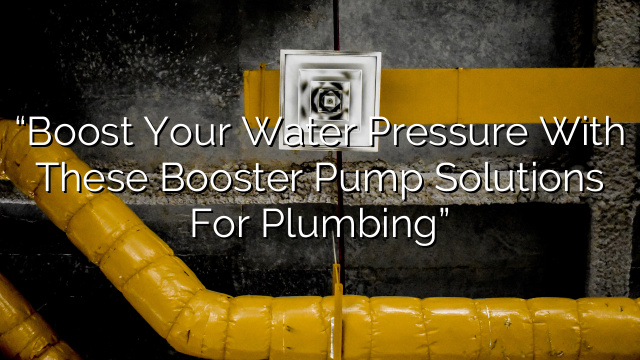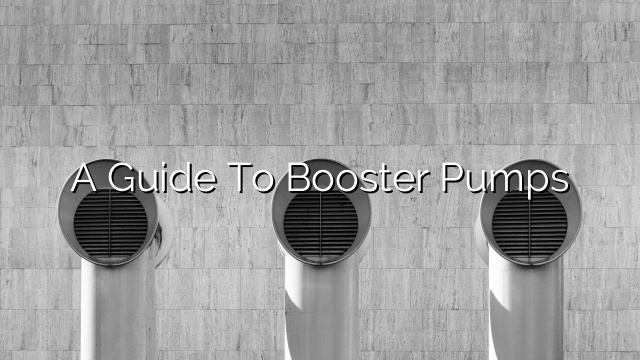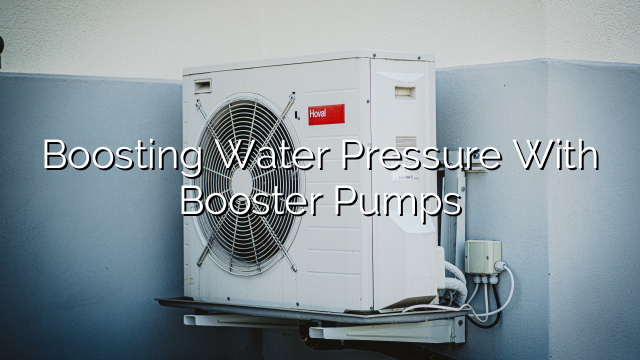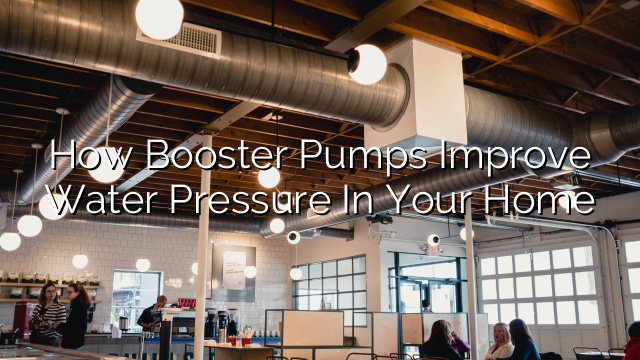Benefits of Booster Pumps for Plumbing
Water pressure is an essential factor when it comes to the efficiency and functionality of your plumbing system. Low water pressure can be frustrating and can affect various aspects of your daily life, from showering and doing laundry to washing dishes and watering your garden. If you are experiencing low water pressure in your home, a booster pump may be the solution you need to increase the pressure and improve water flow.
What is a Booster Pump?
A booster pump is a device that increases water pressure and flow in plumbing systems. It works by drawing water from the main supply line and pressurizing it before distributing it throughout the house. Booster pumps are commonly used in buildings with multiple floors or in areas with low water pressure, such as rural and hilly areas.
Types of Booster Pumps
There are several types of booster pumps available on the market, each designed to suit different plumbing setups and water pressure requirements. Here are a few common types:
- Single-stage booster pumps: These pumps are capable of delivering moderate pressure increase and are suitable for small homes or applications that don’t require high water pressure.
- Multi-stage booster pumps: These pumps are designed to provide high-pressure boost and are ideal for large homes, commercial buildings, and irrigation systems.
- In-line booster pumps: These pumps are installed directly in the water supply line and are a space-saving option. They are typically used in residential applications.
- Submersible booster pumps: These pumps are installed in the water tank or well and are submerged in water. They are commonly used in deep well systems where water needs to be pumped to the surface.
Signs You Need a Booster Pump
If you are experiencing any of the following signs, it may be a good indication that you need a booster pump for your plumbing:
- Low water pressure: If you notice weak water flow from faucets, showers, or other plumbing fixtures, a booster pump can help increase the pressure.
- Fluctuating water pressure: If your water pressure varies throughout the day, it could be due to high demand or low supply. A booster pump can regulate and maintain a consistent water pressure.
- Poor performance of appliances: Appliances that rely on water, such as washing machines and dishwashers, may underperform if there is insufficient water pressure. A booster pump can ensure optimal performance.
- Inadequate irrigation: If you have a garden or lawn that requires regular watering, a booster pump can help deliver sufficient water pressure to your sprinkler system.
- Difficulty filling water containers: If it takes a long time to fill up a bucket, bathtub, or any other water container, a booster pump can speed up the process and save you time.
Installation Considerations
Before installing a booster pump, there are a few considerations to keep in mind:
- Proper sizing: Ensure that you choose a booster pump that is suitable for your plumbing system. An oversized pump can lead to excessive pressure, while an undersized pump may not be able to provide the desired water pressure.
- Location: Select a suitable location for the booster pump where it can be easily accessed for maintenance and repairs. It should also be protected from extreme temperatures and weather conditions.
- Professional installation: To ensure proper installation and avoid potential plumbing issues, it is recommended to hire a licensed plumber to install your booster pump.
Maintenance and Care
To keep your booster pump running efficiently and prolong its lifespan, regular maintenance is crucial. Here are a few maintenance tips:
- Check for leaks: Regularly inspect the pump and its connections for any signs of leakage. Address any leaks promptly to avoid water damage and pressure loss.
- Clean the pump: Remove any debris or accumulated dirt from the pump to maintain optimal performance. Follow the manufacturer’s instructions for cleaning.
- Monitor pressure levels: Keep an eye on the pressure gauge to ensure that the pump is operating within the recommended pressure range. Adjust the settings if necessary.
- Replace worn-out parts: Over time, certain parts of the booster pump may wear out and affect its performance. Replace these parts as needed or consult a professional for repairs.
Frequently Asked Questions (FAQ)
Q: Can a booster pump cause damage to my plumbing system?
A: A properly installed and maintained booster pump should not cause any damage to your plumbing system. However, it is crucial to ensure that the pump is sized correctly and that the pressure is regulated within safe limits.
Q: How much does a booster pump cost?
A: The cost of a booster pump can vary depending on the type, brand, and capacity. On average, a booster pump can range from $200 to $800. Additional costs may include installation fees and maintenance expenses.
Q: Can I install a booster pump myself?
A: While it is possible to install a booster pump yourself, it is recommended to hire a licensed plumber for proper installation. This ensures that the pump is correctly connected to your plumbing system and helps prevent potential issues.
Q: Can a booster pump be used with a well system?
A: Yes, a booster pump can be used with a well system to increase water pressure. However, it is essential to choose a booster pump that is compatible with your well system and consult a professional for installation.
Q: How long do booster pumps typically last?
A: The lifespan of a booster pump can vary depending on various factors, such as usage, maintenance, and the quality of the pump. On average, a booster pump can last anywhere from 5 to 15 years.
Boosting your water pressure with a booster pump can significantly improve your overall plumbing experience. Whether you are dealing with low water pressure or need increased pressure for specific tasks, a booster pump can provide the solution you need. Consult with a trusted plumber to determine the best type and size of booster pump for your plumbing system and enjoy the benefits of a reliable and efficient water supply.




